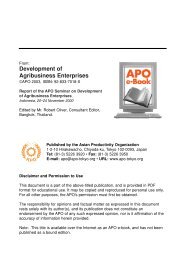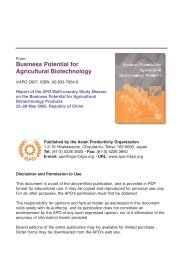Annual Report 2009 - Asian Productivity Organization
Annual Report 2009 - Asian Productivity Organization
Annual Report 2009 - Asian Productivity Organization
You also want an ePaper? Increase the reach of your titles
YUMPU automatically turns print PDFs into web optimized ePapers that Google loves.
to attend the <strong>2009</strong> FOODEX and visit Japanese<br />
organizations involved in importing agrifood products<br />
and promoting exports.<br />
Program coverage: Framework for improving agriculture<br />
productivity and sustainable export of agrifood<br />
products; The global picture in trade of agriculture<br />
and food products: Opportunities and challenges in<br />
the global market; Marketing, key players, and the<br />
distribution system for food products in Japan; and<br />
Market research for agrifood products for export:<br />
Basic principles and current practices. Participants<br />
visited FOODEX <strong>2009</strong> at Makuhari Messe in Chiba;<br />
Tsukiji Fish Market in Chuo-ku, Tokyo; Ota Market<br />
for Fruit and Flowers, Ota-ku, Tokyo; Japan External<br />
Trade <strong>Organization</strong> Tokyo Office; Itochu Shoji, a<br />
Japanese food importer in Tokyo; and the Ito Yokado<br />
store in Kasai, Tokyo.<br />
Community-based Ecotourism Development and<br />
Management<br />
The concept of ecotourism is widely misunderstood<br />
and in practice is often used as a marketing tool to<br />
promote nature tourism. This is called “greenwashing”<br />
when tourism activities are pursued without due<br />
regard to their negative impacts on the environment<br />
and communities. Ecotourism is a business that uses<br />
judiciously natural endowments of the area and the<br />
culture of the community. People involved need to<br />
understand how to manage profitable, sustainable<br />
ecotourism businesses without degrading the environment<br />
and the culture of local people.<br />
The APO organized a multicountry observational<br />
study mission on Community-based Ecotourism<br />
Development and Management, 25–29 May, in Nepal,<br />
to illustrate different approaches and principles in sustainable<br />
development and management of ecotourism<br />
and identify the best management practices in the host<br />
country. Twenty-one participants from 14 countries<br />
attended.<br />
Program coverage: Development of ecotourism in<br />
Asia and Pacific countries: Trends, opportunities,<br />
and challenges; Approaches to community-based<br />
ecotourism management: Some lessons from Nepal’s<br />
experiences; Role of ecotourism in alleviation of<br />
rural poverty and environmental conservation;<br />
and Best practices in sustainable development and<br />
management of ecotourism. Site visits were made to<br />
ICIMOD Research and Field Demonstration Center<br />
in Kathmandu, Godavari Botanical Garden, and the<br />
Borderland Resort.<br />
Promoting Food Safety Management in the Seafood<br />
Industry through National Programs<br />
International trade in seafood has grown fast. About<br />
half of world fish exports originate in developing<br />
countries. Expanding demand for seafood has brought<br />
with it greater business opportunities and challenges<br />
for the seafood-producing countries. Seafood products<br />
are an important source of foreign exchange earnings<br />
for developing <strong>Asian</strong> countries and a rich source of<br />
protein for human nutrition. The seafood industry<br />
provides jobs and livelihoods to millions. The challenges<br />
are high perishability of seafood products and<br />
susceptibility to various safety hazards. Protocols in<br />
quality and safety management programs mostly based<br />
on the Hazard Analysis and Critical Control Point<br />
(HACCP). One example is the ISO22000 standard<br />
that incorporates all HACCP requirements in addition<br />
to the requirements of ISO9001.<br />
The APO is actively engaged in the capacity building<br />
of member countries in food safety. In <strong>2009</strong>, four<br />
national training workshops were organized as followups<br />
to the 2008 multicountry training course on Food<br />
Safety Management for Seafood Processing and<br />
Marketing: in Vietnam, 26–29 May; the Philippines,<br />
3–5 June; Indonesia, 3–5 August; and Thailand, 25–27<br />
November. The objectives were to enhance understanding<br />
of the HACCP/FSMS ISO22000 requirements<br />
and applications in the seafood industry. The<br />
NPOs of each country implemented the workshops<br />
in collaboration with relevant seafood organizations.<br />
A total of 210 participants (48 from Vietnam; 50<br />
from the Philippines, 49 from Indonesia, and 63 from<br />
Thailand) attended.<br />
Visiting Bac Dau Co. Ltd., a fish-processing enterprise, during the<br />
national dissemination seminar on Food Safety, Vietnam<br />
Program coverage: HACCP and GHP requirements;<br />
Current legal and customer requirements related to<br />
food safety in the seafood industry; Process of carrying<br />
out hazard analysis and establishing critical control<br />
points (CCPs) and critical limits with justification;<br />
ISO22000 requirements and applications; ISO22000<br />
implementation and certification; and Food traceability<br />
requirements and implementation.<br />
APO ANNUAL REPORT <strong>2009</strong> 43<br />
AGRICULTURE SECTOR
















